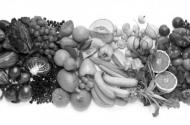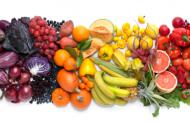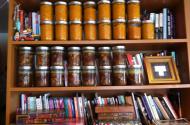I really enjoyed the article, "Is Michael Pollan a sexist pig? "Femivores" have made DIY domesticity cool. But critics who blame feminism for obesity and fast food have it wrong."
As a man who identifies as a feminist, I'm going to comment on this article from my own perspective. First, a little quoting is in order,
"The food movement, with its insistence on how fun and fulfilling and morally correct cooking is, seems to have trouble imagining why women might not have wanted to spend all their time in front of the stove. Since scratch cooking today is largely a hobby or a personal choice of the middle class, many of us wish we could spend more time in the kitchen. But it’s important to remember that this was not always the case.
It’s easy to forget, in the face of today’s foodie culture, that cooking is not fun when it’s mandatory."
When Cooking isn't a Hobby
So true. I am on a medical diet which started out soup-only and gradually  introduced other foods. I have to cook every single meal I eat, and I don't always find it idyllic. Sometimes I'm burning myself while straining huge tubs of chicken broth over a grease-slick floor. I can and dehydrate all of my own food, even while working as a grassroots organizer. Often I wish I could buy food. The sheer need of my body which demands that I spend time in the kitchen can feel oppressive. But owning the "means of production" for one's own health can be liberating as well. I would never recover from my illness if I had to eat processed foods. I simply would remain sick. Until some company starts selling cashew-butter-zucchini-egg pancakes.
introduced other foods. I have to cook every single meal I eat, and I don't always find it idyllic. Sometimes I'm burning myself while straining huge tubs of chicken broth over a grease-slick floor. I can and dehydrate all of my own food, even while working as a grassroots organizer. Often I wish I could buy food. The sheer need of my body which demands that I spend time in the kitchen can feel oppressive. But owning the "means of production" for one's own health can be liberating as well. I would never recover from my illness if I had to eat processed foods. I simply would remain sick. Until some company starts selling cashew-butter-zucchini-egg pancakes.
The article goes on to point out that feminism is not to blame for processed foods,
"The rise of convenience food has to do with market forces, not feminism. After World War II, food companies began unloading packaged food products developed for wartime use on the domestic market: frozen fish fillets, powdered coffee, tinned spinach. These foods were aggressively marketed as wholesome and modern, since housewives were initially suspicious of products like ham that came in a can. But lots of women, it turns out, were simply not so fond of cooking. The twentieth century’s two most popular pro-convenience-foods cookbooks, Peg Bracken’s cheeky 1960 “The I Hate to Cook Book,” with its recipes like Skid Road Stroganoff (“Add the flour, salt, paprika, and mushrooms, stir, and let it cook five minutes while you light a cigarette and stare sullenly at the sink”), and Poppy Cannon’s 1951 “The Can-Opener Cookbook” were hits long before second-wave feminism was so much as a gleam in Betty Friedan’s eye. So why does Betty get blamed?"
Men Who Cook
 As a man, I have learned to cook, and I love to cook for people. As a white man living in a northern, liberal city, my friends are delighted to see me working over a hot stove, and particularly happy if my wife is sitting at the table keeping friends company. I get social points for cooking. Because the burden for cooking has traditionally fallen on women, I think that we men will have to lead the way in cooking for our families in a way that bypasses industrial agriculture.
As a man, I have learned to cook, and I love to cook for people. As a white man living in a northern, liberal city, my friends are delighted to see me working over a hot stove, and particularly happy if my wife is sitting at the table keeping friends company. I get social points for cooking. Because the burden for cooking has traditionally fallen on women, I think that we men will have to lead the way in cooking for our families in a way that bypasses industrial agriculture.
Ultimately, I want to see a world where men or women can choose to cook or stay home with kids. Capitalism would love for all of us to find our worth exclusively in our paid jobs. But, in fact, we are worthwhile because we are children of God. Confidence in homemaking can display a system of meaning alternate to capitalism and money. In fact, patriarchy devalued "women's work" like cooking precisely so it could devalue women. When we re-value cooking and other "women's work," we're constructing a space where all options are valued.
Alternatives to Desecration
 My primary critique of the article is that the author glosses over the substance of the critique of industrial agriculture. Cooking and direct connections to farms are a way of building an economy that reflects good stewardship of the earth and bypasses the broken industrial system that does not reflect biblical, shalom values. In our choices we are to seek harmony with the Spirit of God moving in the world: towards shalom and good stewardship.
My primary critique of the article is that the author glosses over the substance of the critique of industrial agriculture. Cooking and direct connections to farms are a way of building an economy that reflects good stewardship of the earth and bypasses the broken industrial system that does not reflect biblical, shalom values. In our choices we are to seek harmony with the Spirit of God moving in the world: towards shalom and good stewardship.
Acts of Care
 In the context of community, cooking can create community and health. As Margaret Kim Peterson points out, "When we cook, we produce things to eat, of course, but we produce something else too: acts of care."
In the context of community, cooking can create community and health. As Margaret Kim Peterson points out, "When we cook, we produce things to eat, of course, but we produce something else too: acts of care."
When you cook food for someone, you don't divide the check. You give them a gift of both food and time that won't be forgotten. There's nothing wrong with meeting at a restaurant or ordering pizza. But when one has the luxury to do so, it is my belief that cooking can express a greater depth of appreciation for another person than eating together at a restaurant.
Table fellowship is an essential part of Christian hospitality, and cooking a meal expresses love. Cooking a healthy meal also contributes materially to another's well-being. Yes, sometimes cooking can be difficult or messy. But learning to find meaning in the smallest tasks of life is part of our calling. As Robert Farrar Capon puts it, "Only miracle is plain; it is in the ordinary that groans with the weight of glory."
It takes time and focus to learn to love the ordinary. But it's part of our call.
That is to say, the appreciation of life is a moral act. To care for others is a moral act.
According to your gifting, you may appreciate life and care for others in many ways other than cooking and food, but I would argue that there is scarcely a better place to exult in the beauty of creation than the kitchen and the table. We all have to eat.
Amen.







